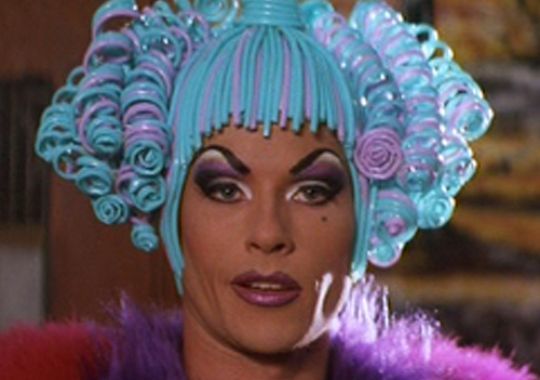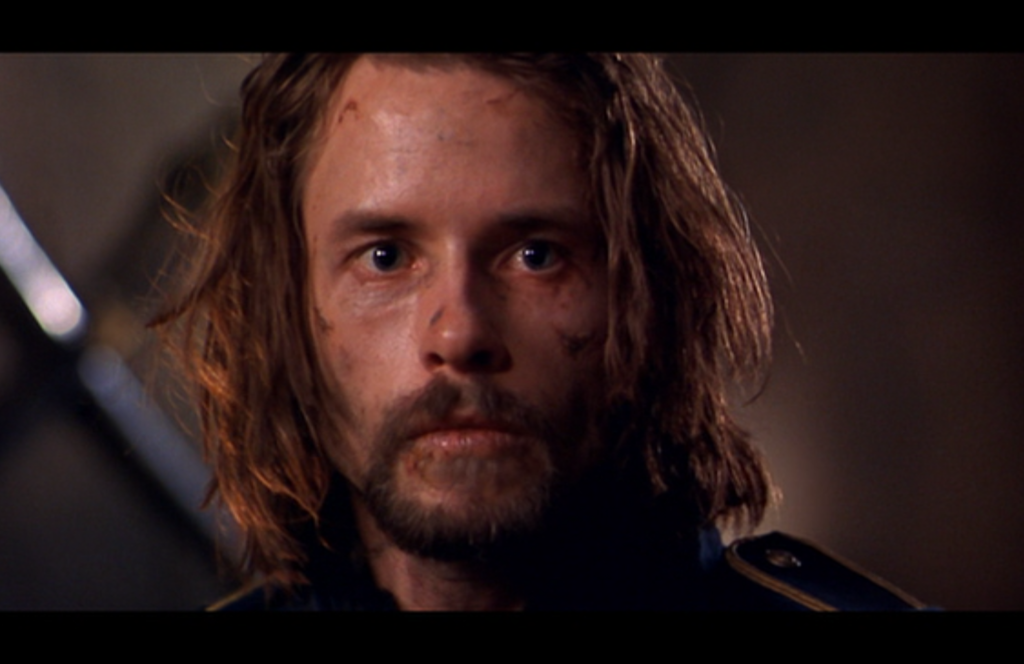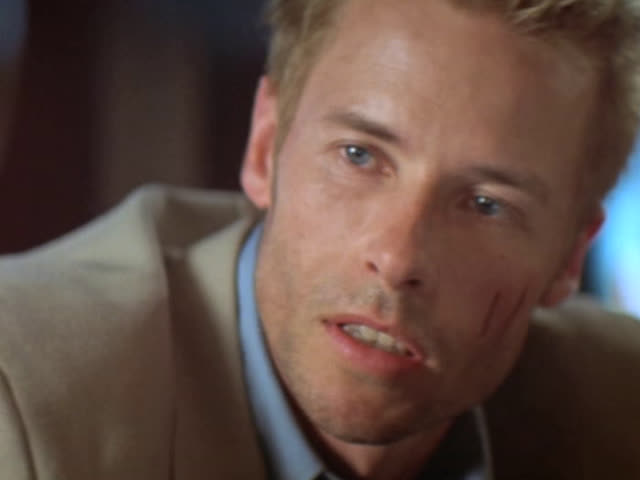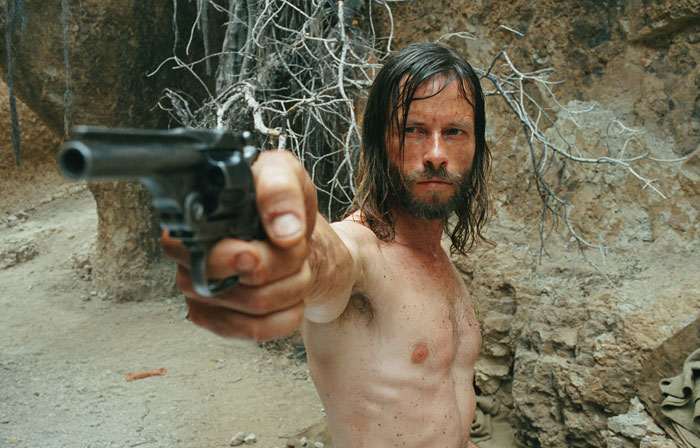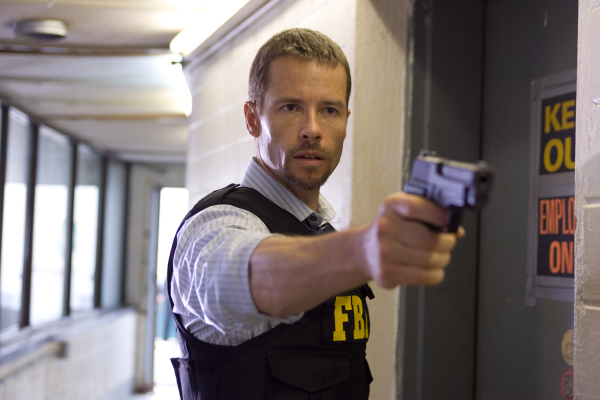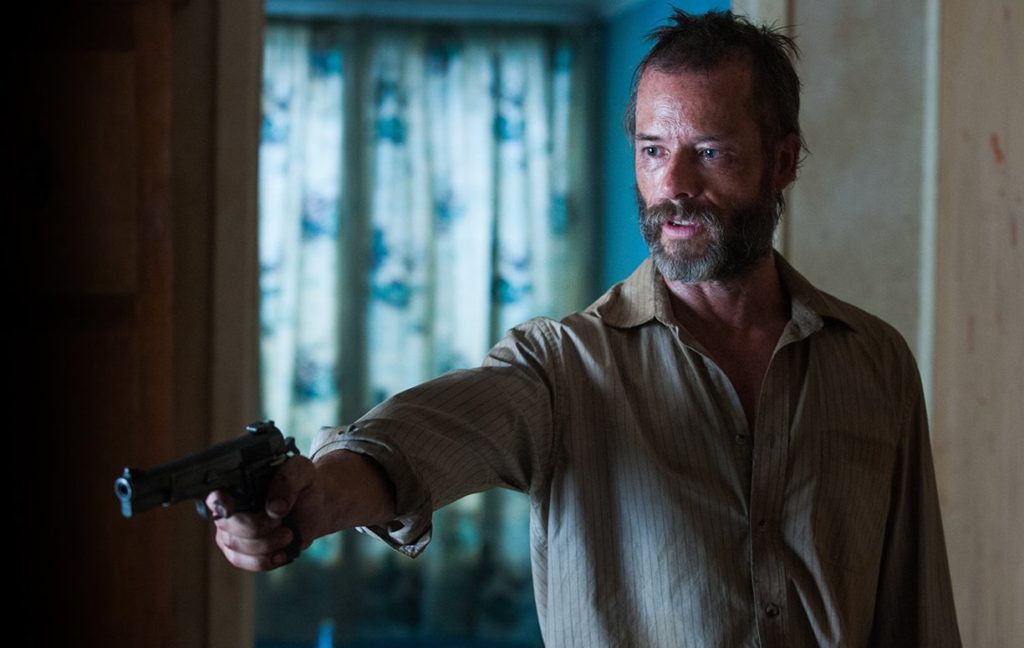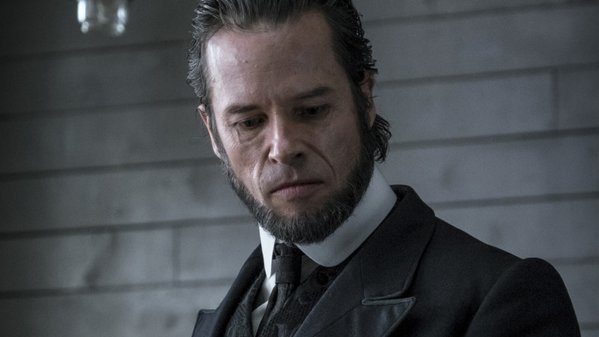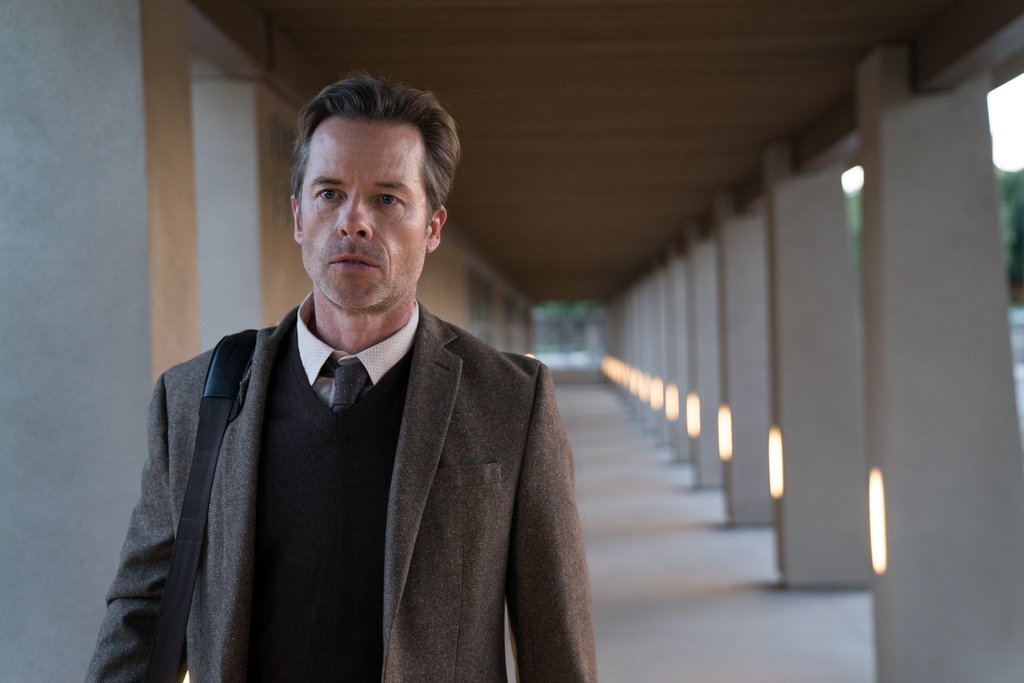Almost immediately after casually pitching the idea of a Top Ten Essentials Guy Pearce ranking here at InSession Film, I realized it’s nearly impossible to whittle down the decades-long tenure of an actor with some eighty credits to his name who never seems to make a bad movie.
Sure, we can eliminate cameos and supporting prestige like The Hurt Locker, Rules of Engagement, The Road, and The King’s Speech. If this is purely a film study, that excises television performances ranging from a cowboy in Snowy River: The McGregor Saga and an Emmy-winning playboy in Mildred Pierce to Ebenezer Scrooge himself and Down Under detective Jack Irish. Tent poles like Iron Man 3 and Prometheus contrast heavies like Lawless, and standard action flicks like Domino or Seeking Justice even out, thanks to impressive crime dramas such as Animal Kingdom and a delicious short film called Lorne.
There is derivative science fiction such as The Time Machine, Lockout, Equals, and Bloodshot. Yet even in a misfired film, Guy Pearce is never the problem. Fortunately, there is yet more on the horizon with The Last Vermeer, Without Remorse, and Mare of Easttown. Biopics, international indies, exorcism thrillers, a directorial debut – for a real deep dive, check out his two albums and the music videos on Guy Pearce’s YouTube channel. It’s possible being an actor who consistently turns in one quality performance after another isn’t even his best pursuit.
Here then are ten Guy Pearce essentials showcasing an impressive range and variety – listed chronologically because tie breakers on my favorites are impossible.
The Adventures of Priscilla, Queen of the Desert
Husband Hugo Weaving (The Matrix), hothead Guy Pearce, and transwoman Terence Stamp (Superman II) embark on a sparkling, chuckle inducing, cross country trip full of flamboyant Best Costume Design winning frocks in this 1994 Australian comedy. I used to stay up watching every Priscilla late night cable airing, and upon rewatching I’d forgotten how much I enjoyed the excellent banter, sing song deliveries, and catty interplay. Back then, I initially thought this was just a quirky show about drag queens who aren’t very good at what they do – putting on lipstick alongside the outback lizards and their broken down bus with the terrible zebra print interiors. The more I watched, however, the more I loved the interwoven details and courageous relationships, and Stamp is awards worthy as the grieving Bernadette facing old age and uncertainty. Persecutions and pain arise at bars not serving “people like you” while rough housing and unreceptive crowds exacerbate our trio’s jealousy, kept secrets, and conflicts. How does a father come out or explain his unconventional marriage to his fellow queens? Amusing flashbacks also provide deeper characterizations; being a man one day and a woman the next is not an easy thing to do, and some parents won’t speak to their child after his “chop.” While the old white folks drive past our three girls in need of assistance, Aboriginals and youths join in with the Gloria Gaynor, opera, and classic tunes. A blow up doll kite, a jogger repeatedly passing the bus, the flip flop dress, and that giant high heel shoe atop the Priscilla add flair to the beautiful landscapes that just happen to have a man in a dress dancing on the hill. Although there are a few dated stereotypes and inappropriate terms here; the honesty, tenderness, and sincerity shine through. Putting on the performance is really about being bold enough to live in your skin – or wear an Abba turd around your neck – and yes, Mitzi and Felicia become a couple, prove me wrong. I wish every budding bigot could be cut off at the homophobic pass by watching this film.
L.A. Confidential
“Have you a valediction, boyo?” Tween me knew why classics were classics, but this 1997 crime thriller directed by Curtis Hanson (Wonder Boys) and co-written by Brian Helgeland (Mystic River) based on the James Ellroy novel was the first modern film where I realized great cinema was still being made. Russell Crowe (Gladiator), James Cromwell (Babe), Best Supporting Actress winner Kim Basinger (Batman), and more join Guy Pearce for an interwoven, complex tale of corruption, racketeering, politics, murder, blackmail, racism, and hookers cut to look like movie stars. The excellent, ever quotable Best Adapted Screenplay retains the essentials from the novel while mood-setting classic cars, curls, satin, television references, and vintage tunes create a silky smooth veneer to hide the seedy and cigarettes. Nods to filmmaking from the era give way to contemporary pace as subtle actions happen in both the foreground and background, forcing the viewer to pay attention to the visual sleight of hand and re-watch at least twice or…one hundred and fourteen times. Sex, violence, and sophisticated characterizations never underestimate the audience as the puzzle pieces come together for more interconnected scandals, elaborate crimes, and old fashioned good cop/bad cop. Two-way interrogations and shotguns blasts in the elevator provide grit, shocks, and suspense; yet the camera knows when to be still while the the actors act – riding the drama to its crest without need for compensation like today’s over the top hitting the audience on the head. Pearce’s Exley is the hated, calculating lieutenant we come to cheer, and our detectives must unite as dames, tabloids, and set ups collide in one final shootout. How Titanic won Best Picture over this I will never understand, and it’s also is a Christmas movie, fight me. Remember, “Reciprocity…is the key to every relationship,” “A hooker cut to look like Lana Turner is still a hooker, she just looks like Lana Turner,” and “Rollo Tomasi.”
Ravenous
Heaps of blood can’t hide the rushed production, behind the scenes turmoil, and technical mistakes in director Antonia Bird’s (Mad Love) 1999 horror western comedy mixing Mexican War history, Donner family meatiness, and nineties tongue in cheek. Patriotic, gluttonous celebrations nauseate Guy Pearce’s cowardly Captain Boyd, who played dead while the bloody bodies of his fellow officers dripped into his mouth. Boyd is posted to a seemingly quaint former Spanish fort with other army misfits, drunkards, and silent locals. Crosses and rosaries contrast peyote and Wendigo legends of men consuming their enemy to take his spirit, but that’s no different from the white man eating the body of Christ on Sundays. Half frozen stranger Robert Carlyle (The Full Monty) tells fireside tales of famished pioneers eating the malnourished deceased, so our troops set off to rescue any survivors. Beautiful mountains, period uniforms, and rustic scoring suggest an innocent adventure, but screams in the night and claims of someone licking their wounds raise the ominous mistrust as the banjo twang changes to pulsing beats and eerie discord. Separations, revelations, and a pit of bones escalate to quick violence, stabbings, axes, and gunshots. Zany one liners and crazy chases laugh at themselves and the bone cracking soldiers who fell for it – literally – but the hesitant Boyd remains sickened by his tasty temptations. Faith versus thirst quenching cannibalism layers the social commentary amid vampire-esque blood at the mouth, phases of the moon indicating the passage of time, and freezing soldiers resorting to desperate delectables, juicy deceptions, and mad men reversals because the more you eat, the stronger you become. The inside out cloak is now a symbolic red, and while the first half provides isolated outdoor horrors, the last forty minutes is cabin fever claustrophobic with intimate fighting, homoerotic psychological tension, and cannibal contemplation. Chill perpetrators invite fellow soldiers to contribute in the hearty stew and embrace their palate predilections before a final savory struggle and battle of wills. Despite the moral questions, viewers must be able to laugh at this demented, fascinating parable and it’s delicious food for thought.
Memento
“I have this condition.” Perhaps it’s understandable that the backwards storytelling and interwoven black and white conversations in this 2000 Christopher Nolan mind bender nominated for Best Original Screenplay and Best Editing bother many viewers. However, from the opening reverse gunshot to the final stop at the tattoo parlor, we’re within the dilemma, trying to solve a crime when we can’t remember the scene before despite Polaroids, repetition, habit, and routine. As an insurance investigator, Leonard Shelby spotted the phonies, but anterograde amnesia has left him with the need to avenge his late wife but with no concept of time. Early scenes explain the memory loss, but the homemade tattoos, similar women, redacted files, and generic facts are suspect. Pulsing beats and hectic imagery match the hurried in medias res before sudden stops as the ignorance is bliss resets. Mirrors and reflections add to the who’s helping or using whom friend or foe duplicity. The audience is aware something’s off kilter, but we’re on Leonard’s side thanks to tender music, loss, and the nights alone with his wife’s belongings. Tears, doubts, realizations, and willful denial ironically make for one of the most unforgettable performances of the aughts – for which Guy Pearce received no Oscar nomination when, by golly, he should have won. Even if he’s not faking, Leonard is frustrated at bluffing through the need to socialize or converse. He feels guilty without knowing why, but distrusts hearing the truth from others. Leonard is aware people mess with him and laughs off the double motel booking and those tricky push or pull doors. We take certainties for granted while he desperately scribbles notes before waking up to grief and the cold bed. Viewers see slip ups Leonard dismisses – his hurt hand, the missing pens, needles, scratches, license plates. He says he’ll take a photo and get another freaky tattoo when the deed is done, but his vengeance must have meaning whether he remembers it or not. Rather than intrude, the backward design amplifies the lies we tell ourselves to be happy, and this ahead of its time multiple viewing masterpiece keeps on giving in this age of social media distortion. Leonard is helpless to retain critical information, yet we’re fascinated when he lets details pass because he remembers what he wants to be true. Don’t we all? “Now, where was I?”
The Proposition
Prison wagons, burned homes, barren trees, and lightning mar beautiful prairies, cliffs, night skies, and the ever watchful moon in this 2005 western written by Nick Cave and directed by John Hillcoat (both of whom reunited with Pearce for The Road and Lawless). The so-called civilized attempt to tame the hellish, godforsaken Australia struggles thanks to shabby buildings, muddy streets, and violent attacks. The Union Jack billows high in the dusty breeze, but the white picket fence can’t keep out the assaults, spears, or whips, and the only way to stop the brutality is to be more brutal. Trooper Captain Ray Winstone (The Departed) offers outlaw Guy Pearce the chance to save his younger brother from the scheduled noose on Christmas if he kills their older, said to be more beast than man, brother Danny Huston (The Constant Gardener). Town official David Wenham (Lord of the Rings) demands a flogging display and genteel Mrs. Emily Watson (Breaking the Waves) intrudes upon the massacres, revenge, and chains with parasols and tea. The crazed and fearful don’t sleep as nightmares underscore the lack of life giving in this on edge, unforgiving land. Outlaws are mannerly one moment and disloyal or barbarous the next, but they sing so sweetly as they attack. Emaciated Pearce is a wounded shell, his ribs showing as if he’s consumed from inside out, guilty and wasting away on this quest. Slow motion, hard riding scenes become slightly surreal as if our historical walkabout strayed into an inescapable purgatory while Cave’s lyrics and score address unspoken characterizations like a voice on the wind in the wilderness. Colonial wrongs, racism, and Aboriginal mistreatment intertwine with the tormented fates as boarded up homes await retribution. Buzzing flies, beatings, and dead animals escalate to gory head shots, beheadings, and putting foolish people out of their misery because the violence doesn’t respect holiday prayers and the Christmas turkey. This film makes you feel the need to bathe – not because of the dirty, grimy, and bloody, but its festering complexity.
Traitor
1978 Sudan prayers and car bombs give way to contemporary Yemen raids, explosive business deals, and political intrigue in this 2008 terrorism thriller as FBI Agent Guy Pearce pursues suspected soldier Don Cheadle (Hotel Rwanda) amid underlying racism, religion, and officially unofficial interrogations. Parallel prison escapes and bombing investigations make the case for both sides, but our southern baptist agent is not willing to consider the stereotypical, radical extremes of our Muslim special forces expert despite deliberate actions and conflicts of faith. Who kills the innocent and lies to themselves about being the good guys? Compared to today’s cool high tech; multiple languages, old school maps, folders, and paperwork keep the case tactile alongside retro push the button explosives and homemade devices. Choice direction with point of view zooms and camera movement following the players builds tension toward the costly connections, crossfire, and inevitable bangs as hypocritical leaders, interpretive beliefs, and withheld intel question who’s on the right side – or just thinks he is. The truth is complicated thanks to lies, turncoats, and those in too deep losing control. Though dated in its portrayals and occasionally confusing thanks to superficial transportation fixes and fast locations making things easy when we’re now accustomed to a long form attention to detail. The chess characterizations, chases, one on one roughness, and ticking clocks in the final twenty minutes provide personal dilemmas of interest both then and now. Freedom from consequences is not absolution and bigotry hasn’t changed. This is an intense little caper with fine performances and a whiff of bigger themes making one wonder why mid budget thrillers fell out of favor and how audiences were still sleeping on Cheadle and Pearce back then – and for shame if you still are.
The Rover
Robert Pattinson (Twilight) co-stars in director David Michod’s (Animal Kingdom) 2014 desolate Australian parable set ten years after an economic collapse. Despite little dialogue, the audience is immediately hooked by the empty highways, horizon to nowhere, and road rage with desperate revving and relentless standoffs. Guy Pearce’s car has been stolen, and you don’t want to get on his bad side. Everything has a price – his car for the robber’s simpleton brother Rey – but triggers are always at the ready and army remnants get in the way. The dirty bearded Pearce matches the tumbleweeds and road trip to nothing as social skills are gone. Yet all are old enough to remember life before this torment. Somber notes and simple music people could make themselves create a subdued score while retro beats mirror the uncivilized regression and a lone pop moment recalls what used to be. Trains, previous industry, mines, and the US dollar remain of value compared to other worthless papers, but loyalty seems lost and there’s little reason to wake up in the morning. Talkative, annoying Rey is somehow endearing; we enjoy his chuckle inducing moments and surprising innocence because we know he would be different if life was as it should be. Unnamed onscreen Pearce has a crazed look in his eye and a jaded, terse delivery when he bothers to converse. His aim is excellent, killing one but protecting another when not eating and only sleeping outside if at all. We have every reason not to trust him, yet his quiet threatening is our off center moral compass questioning why nothing matters except this sense of loss and lawlessness. Ironically, he is a better brother to Rey, and the younger starts to emulate him in all the wrong ways as their relationship develops with superb one on ones and inadvertent teamwork. Neither can stop thinking about the dead and that is the price they pay. Interior confrontations, shootings gone wrong, and lack of consequences lead to blame, tears, and nothingness. We have no reason to like this world, yet we care thanks to the powerful performances and upsetting but beautiful storytelling. This is an excellent character study laced with social examinations, and once again, it’s disappointing more awards were not won.
Results
Some may dislike writer and director Andrew Bujalski’s (Computer Chess) mumblecore style and the meandering focus of this 2015 slice of life romance starring feisty Cobie Smulders (The Avengers), clueless Guy Pearce, and lazy Kevin Corrigan (Grounded for Life). Our tidy expectations make the uneven random seem unpolished low budget, however the guru fitness winks, rustic Texas film making, and not so perfect people do not adhere to the stereotypical romantic comedy formula. Each immature piece of our love triangle struggles despite his or her age, wealth, or status, leading to an understandable awkwardness between the fit and not so fit. Trainers insist they aren’t the food police, but…you’re only lying to yourself, virtually stalking, and throwing money away to fix what you can’t control. Youtube gym promos match the naturalistic dialogue – amateur but realistic, scripted but off the cuff. There are no poised cross coverage cuts with romantic crescendos here, just in scene raw emotion and vulnerability. Elemental mantras and goal setting regimes stand no chance against blurred professional lines, misunderstood attractions, transferred emotion, and depressing honesty. Chuckle inducing asides, off key music, and goofy montage twists accent the bickering, it’s complicated business deals, and visions of grandeur giving way to the dog sleeping on the treadmill. The “No Fear, Excuses, Surrender” poster has its “No” obscured, and we see our messy selves in these in love or in therapy personalities. Deflections and defense mechanisms mean you don’t give in so you get your way, but then you also miss the bumbling feelings trying to be expressed while you’re always on the run – literally and figuratively. Such competitive interplay and lack of perfection is refreshingly fun, and calling this a romantic comedy is a little unfair to the self aware quirky drama not following the happily ever after recipe. At first I wasn’t sure if I liked this, but the charm here has grown on me with repeat viewings, and this unique, sarcastic, offbeat tale is worth a look.
Brimstone
Dakota Fanning (Once upon a Time in Hollywood) is the mute midwife afraid of foul minister Guy Pearce in this layered, heavy, and uncomfortable 2017 European co-production written and directed by Martin Koolhoven (Schnitzel Paradise). Sermons warn of false prophets and abductions. Torturous injuries and hellish persecution come disguised as divine. Western shootouts, brothels, servitude, and injustice accent the abstract medieval morality play while horses, hymns, and wagons add desolate authenticity and a lawless atmosphere. The natural outdoor palette parallels the out of order vignettes – rustic autumn, summer saloons, fertile spring, and snowy cleansing – as white steeples, men in black, burning buildings, and women in the mud speak for themselves. Many actors today would not take on the role of a foreboding reverend justifying his demented righteousness, but Pearce is an extremely unlikable manipulator, nameless save for his misused title and creepy scriptures. His taunting punishments and shuddering attachments fester into an unstoppable, almost immortal embodiment, and this hellbent howling may be his darkest, finest performance. Likewise, Fanning looks the pioneer part, strong but worn, struggling in this unforgiving landscape and resisting evil no matter the price. Carice van Houten’s (Game of Thrones) gagged and whipped wife is also sorrowful and helpless, and we root for the women who must obey the patriarchal nastiness. Once there is blood there is no innocence, and the vicious Little Red Riding Hood cycle escalates with gunfire, hangings, and choice red. Horrific scenes, hardcore storytelling, and numbing brutality are not for the faint of heart, but the lack of cinematic restraint transcends genre and strips viewers to our limits.
Spinning Man
Professor Guy Pearce, detective Pierce Brosnan (GoldenEye), and wife Minnie Driver (Phantom of the Opera) crisscross amid police blotters, yellow tape, and missing students in this cerebral 2018 thriller. Seemingly happy family fun gives way to professors debating guilt versus objective reason amid student crushes, stolen glances, and unspoken flirtations as the camera lingers on an inviting smile and the long cigarette drags. Although unnecessary flashes of possible crimes and wishful fantasy break the suspect or family man tension; paralleling mirrors and choice editing accent the argumentative. Philosophy lectures and literal versus figurative plays on words build intrigue, for it’s easy to talk one’s way out of anything if the truth is subjective. Routine interrogations, circumstantial evidence, and mismatched alibis, however, make our professor lose his cool, and the pesky, close to the vest police have their own unnerving existential theories. No one says what they mean, and a mother must protect her children as guilty perceptions and don’t look good deceptions provide duality and destructive facades. Viewers looking for tense a minute may be disappointed by some of the did he or didn’t he round and round spin, but the dramatic ensemble provides mature introspection as the lies come full circle.
More Honorable Mentions: The Count of Monte Cristo, First Snow, Hateship Loveship, 33 Postcards
What’s YOUR favorite Guy Pearce performance?



